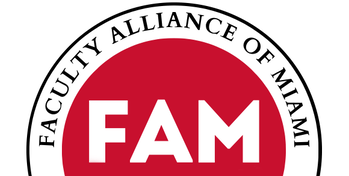Miami AAUP stands in solidarity with protesters denouncing the racist structures that create “group-differentiated vulnerability to premature death” for Black and brown people. We mourn the deaths of George Floyd, Breonna Taylor, and the Black victims of police or extralegal violence in our own area whose killers remain unpunished—John Crawford (2014), QuanDavier Hicks (2015), Sam Dubose (2015), Timothy Thomas (2001), Henry Corbin (1892) and Simon Garnett (1877), and many, many more. We also honor the survival and strength of our Black colleagues and students and their ongoing efforts to overcome racism at Miami and in our region (including the recent fight to get Douglas Brooks out of the classroom). The long fight has burst once more into furious flower. We must all work to ensure that it bears fruit.
That’s why we do not want simply to issue solidarity statements (a commitment to antiracism is already part of our chapter’s mission). Instead, following the leadership of Black faculty, we intend to create lasting and material improvements with and for Black and brown faculty and students so that Miami becomes a community where Black study and Black freedom can flourish across disciplines, departments, quads, classrooms and offices. Until then, none of us will truly study or think in freedom.
With a group of faculty, we are preparing a petition/statement that will include specific recommendations based on the Committee on Diversity and Inclusion’s recommendations for 1) accountability mechanisms and 2) audits of existing structures and practices (such as Miami policies and OEEO procedures) that have served as barriers to change. We will recommend several specific changes to policy that we hope Senators will join with us in pushing through next year.
We will not publish the petition/statement until we have received and incorporated feedback from faculty, staff and students among and beyond our membership, especially Black and brown faculty. Our community must demand that the President and Provost act as strong advocates against racism, support them when they do, and hold their feet to the fire when they don’t.
Finally, AAUP must also examine our own practices, educating ourselves and revising our procedures and policies wherever necessary so that we can be more effective antiracist advocates and allies.

Leave a Reply